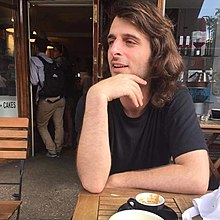Daniel Neofetou
Daniel Neofetou (born 1 February 1989) is a British writer and theorist. He is the author of the books Good Day Today: David Lynch Destabilises the Spectator (2012) and the forthcoming Rereading Abstract Expressionism, Clement Greenberg and the Cold War (2021). He is a regular contributor to The Wire and Art Monthly, and has written for Mute, Complex, Flash Art and Le Phare, the journal of Le Centre culturel suisse.[1][2][3][4][5] He has also published academic journal articles in Journal of Contemporary Painting and Quarterly Review of Film and Video.[6][7]
Daniel Neofetou | |
|---|---|
 Daniel Neofetou, May 2016 | |
| Born | 1 February 1989 Leamington Spa, England |
| Nationality | British |
| Alma mater | Goldsmiths, University of London |
Early life
Neofetou was born in Leamington Spa, England on 1 February 1989. He studied at University of Warwick, University of Edinburgh and Goldsmiths, University of London, at which he completed a PhD entitled Eyes in the Heat: The Question Concerning Abstract Expressionism, initially under the supervision of Mark Fisher, and subsequently under the supervision of Josephine Berry and Marina Vishmidt.[8]
Career
His first book, a monograph on David Lynch entitled Good Day Today: David Lynch Destabilises the Spectator (2012), was published by Zero Books.[9][10][11] In 2018, he curated Divine Cargo, an evening of performance art at South London Gallery.[12] In 2018, he contributed to ‘The Annotated Reader’, a publication and exhibition curated by Ryan Gander. In early 2019, he contributed a short essay to the King's College London project "Technologically Fabricated Intimacy."[13]
His second book, Rereading Abstract Expressionism, Clement Greenberg and the Cold War, is forthcoming in May 2021 with Bloomsbury Publishing.[14]
Bibliography
- Good Day Today: David Lynch Destabilises the Spectator. Zero Books, 2012. ISBN 978-1-7809-9767-4
- Rereading Abstract Expressionism, Clement Greenberg and the Cold War. Bloomsbury Visual Arts, 2021. ISBN 978-1-5013-5838-8
References
- Krogh Groth, Sanne; Schulz, Holger. The Bloomsbury Handbook of Sound Art. NY: Bloomsbury Academic, 2020. ISBN 978-1-5013-3881-6
- Neofetou, Daniel. "Art Investigation". Art Monthly, 17 June 2018. Retrieved 26 July 2020
- Clark, Tom. "Consistency (or indexicality)" Research.tomclrk.com, 2018. Retrieved 26 July 2020
- Neofetou, Daniel. "Brief and Wholly Concrete Moments". Mute, 28 October 2015. Retrieved 26 July 2020
- Neofetou, Daniel. "Damn Good Coffee: David Lynch Adverts Up There With Twin Peaks?". Complex UK, 8 October 2014. Retrieved 25 July 2020
- A world for us: On the prefiguration of reconciliation in Barnett Newman’s painting. Ingenta Connect. Retrieved 25 July 2020
- "Laughing and Crying and Dancing: The Limits of Human Behavior in Swing Time (1936)". Taylor & Francis online, 30 January 2014. Retrieved 25 July 2020
- "Eyes in the Heat: The Question Concerning Abstract Expressionism". Goldsmiths, University of London. Retrieved 25 July 2020
- "Good Day Today: Synopsis, Reviews". John Hunt Publishing. Retrieved 25 July 2020
- Buckland, Warren. "David Lynch swerves: uncertainty from Lost Highway to Inland Empire". Taylor & Francis online, 30 January 2014. Retrieved 25 July 2020
- "Good Day Today: David Lynch Destabilises the Spectator". Google Scholar. Retrieved 25 July 2020
- "Divine Cargo, Sat 11 AUG 2018, 6PM". South London Gallery, 2018. Retrieved 25 July 2020
- "Technologically Fabricated Intimacy". King’s Cultural Community. Retrieved 26 July 2020
- "Rereading Abstract Expressionism, Clement Greenberg and the Cold War". Google Books. Retrieved 26 July 2020